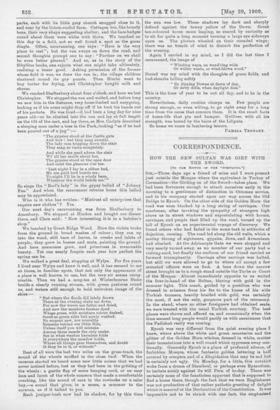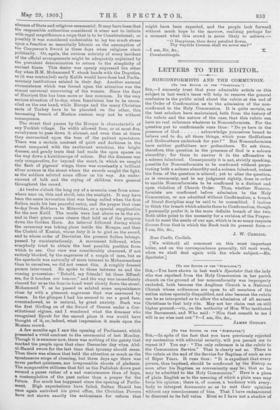CORRESPONDENCE.
HOW THE NEW SULTAN WAS GIRT WITH • THE SWORD.
[To vu. EDITOR Or TUB SP SOT/MGR:1
Sra,—Three days ago a friend of mine and I were present just outside the Mosque where the equivalent in Turkey of Coronation—the Girding on of the Sword—takes place. We had been fortunate enough to attach ourselves early in the morning to a gentleman of distinction in Ottoman service, and in his company started upon our way across the Old Bridge to Eyoub. On the other side of the Golden Horn the road was soon blocked by a long string of carriages. Our coachman, after invoking the sympathy of strangers high above us in street windows and expostulating with horses, carriages, and people that filled up the road, turned up the hill of Eyoub on an experimental voyage of discovery. We found others who had failed in the same task in attitudes of dejection, cursing. The road led along the old walls, which a motley throng of sightseers, gypsies, Jews, and Armenians, had climbed. At the Adrianople Gate we were stopped and very nearly turned away, as no member of our party had a visiting-card, but finally the uniform of our friend carried us forward triumphantly. Carriage after carriage was halted, but still we were allowed to go to where all except a few mounted officers were on foot. A lane down the narrow street brought us to a rough stand outside the Tarim or Court of the Mosque. Almost immediately opposite to us waited the four-in-hand of the Sultan, blazing with gold in the summer light. This coach, guided by a postilion who was dressed in crimson from his fez to the knees of his wide Turkish trousers, heavily braided with gold, was certainly the most, if not the only, gorgeous part of the ceremony. In the stand, where no other foreigners had obtained seats, we were treated with the usual Turkish courtesy. The best places were shown and offered us, and occasionally when the time seemed long people would pacify us with assurances that the Padishah really was coming.
Eyoub was very different from the quiet evening place I knew, where above the white and green cemeteries and the glitter of the Golden Horn witches, dressed in white, mutter their incantations into a well round which cypresses sway con- tinually. Generally Eyoub is a place of profound silence, of forbidden Mosque, whose fantastic golden lettering is half covered by creepers, and of a dilapidation that may be sad but is certainly not ugly. On Monday, for a little, this outskirt woke from a dream of Stamboul, or perhaps even Byzantium, to imitate sorely against its will Pera of to-day. There was certainly none of the fanaticism apparent that is supposed to find a home there, though the fact that we were Englishman was not productive of that rather pathetic greeting of delight which it ensured at the Declaration of the Constitution. It was impossible not to be struck with one fact, the emphasised absence of State and religious ceremonial. It may have been that the responsible authorities considered it wiser not to initiate with regal magnificence a reign that is to be Constitutional; or possibly it was considered undesirable to lay too much stress upon a function so essentially Islamic as the assumption of the Conqueror's Sword in these days when religions clash politically. Or, again, the curious sobriety of every incident of the official arrangements might be adequately explained by the prevalent determination to return to the simplicity of ancient times. This desire was openly expressed the other day when H.M. Mohammed V. shook hands with the Deputies, as (it was contended) early Kalifs would have done had Parlia- mentary institutions existed in their day. Another unusual circumstance which was forced upon the attention was the almost universal uncovering of the women. Since the days of Hurriyet this has been more or less common. In the very serious situation of to-day, when fanaticism has to be recon- ciled on the one hand, while Europe and the many Christian sects of Turkey have to be placated on the other, this increasing breach of Moslem custom may not be without consequence.
The street that passes by the Mosque is characteristic of any Turkish village. Its width allowed four, or at most five, cavalrymen to pass down it abreast, and even then at times they encroached upon the toes of the patient spectators. There was a certain contrast of quiet and darkness in the street compared with the exuberant sunshine, the bright dresses, and gaudy tents that had made the open spaces on the way down a kaleidoscope of colour. But the dimness was only comparative, for beyond the court, in which we caught the flash of pigeons' wings, there was constantly a. brilliant silver avenue in the street where the swords caught the light, as the soldiers saluted some officer on his way. An under- current of talk and the crying of children were general throughout the crowd.
At twelve o'clock the long cry of a muezzin rose from some- where near us, thin and shrill, into the sunlight. It may have been the same invocatiou that was being called when the first Sultan made his lees peaceful entry, and the prayer that rises to-day from Bokhara to Mitrovitza, or a special supplication for the new Kalif. The words were lost above us in the air. and in their -place came cheers that told us of the progress down the Golden Horn. An interval followed during which the ceremony was taking place inside the Mosque, and then the Chelebi of Koniab, whose duty it is to gird on the sword, and to whose order of Dervishes the present Sultan belongs, passed by unostentatiously. A movement followed, when everybody tried to obtain the best possible position from which to see. Our view was considerably obscured, if not entirely blocked, by the eagerness of a couple of men, but as the spectacle was naturally of more interest to Mohammedans than to ourselves, we did not resent this. A roughly dressed person intervened. He spoke to those between us and the coming procession : " Behold, my friends ! let these Effendi see, for it touches our honour," and the way was immediately cleared for us as the four-in-hand went slowly down the street.
Mohammed V. as he passed us saluted some acquaintance close by with a pleasant eagerness that was answered by cheers. In the glimpse I had his seemed to me a good face, overshadowed, as is natural, by great anxiety. Such was the first Girding on of the Sword of Osman under a Con- stitutional regime, and I wondered what the dreamer who recognised Eyoub for the sacred place it was would have thought of it, or, indeed, what impression it made upon the Moslem crowd.
A. few months ago I saw the opening of Parliament, which Presented a vivid contrast to the ceremonial of last Monday.
Though it is summer now, there was nothing of the gaiety that marked the people upon that clear December day when Abd- ul-Hamid swore for the last time that tyranny should cease.
Then there was silence that held the attention as much as the spontaneous surge of cheering, but three days ago there was never perfect quietness, nor irrepressible shouts of gladness.
The comparative stillness that fell ae the Padishah drove past seemed a pause rather of a sad reminiscence than of hope, a contemplation of the past rather than a prayer for the future. For much has happened since the opening of Parlia- ment. High expectations have failed, Sultan Hamid has onoe again smirched his great office, the Christian Powers have not shown exactly the enthusiasm for reform that might have been expected, and the people look forward without much hope to the morrow, realising perhaps for a moment what this crowd is never likely to achieve :- " 0 Happiness, thou dewy petalled flower, Thy wayside blossom shall we never see?"
Constantinople.







































 Previous page
Previous page